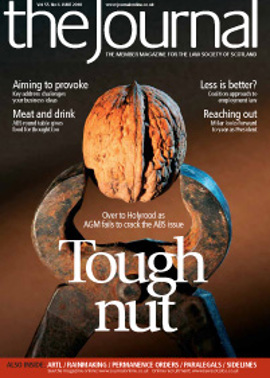Thumbs up for Google?

In a previous article (“On the Mark”, Journal, December 2009, 44) our colleague Ross Nicol commented on the Advocate General’s opinion in the ongoing dispute between Google and three French companies regarding their use of AdWords. In March 2010, the European Court of Justice (ECJ) issued its decision in the three joined cases (C-236-238/08).
Interestingly, the decision departs from the reasoning behind the Advocate General’s opinion. It sets down a number of key principles for considering whether there has been trade mark infringement in this area of dispute between brand owners and competitors/counterfeiters.
AdWords: the issues
AdWords is a commercial service operated by Google which allows advertisers to bid for and register keywords, including words which correspond to trade marks belonging to their competitors.
When a Google user types that keyword into the search box, it returns an advert known as a “sponsored link” above and/or beside the natural search results. In effect, this allows advertisers to promote their goods/services through Google searches by using the trade marks of their competitors. Google receives payment each time a user clicks on an advert generated by the keyword. A trade mark proprietor will often be forced to pay a higher “price per click” to try to ensure its adverts feature prominently over those of its competitors in search results.
Google was pursued by Louis Vuitton, Viaticum and CNRRH for trade mark infringement in respect of its use in its AdWords service of keywords which were also trade marks. The action by Louis Vuitton concerned use of its trade marks by a provider of counterfeit goods, while the other two actions dealt with liability for use of the trade marks to offer competitors’ goods and services.
The main issues before the ECJ were (1) whether Google was able to rely on the E-Commerce Directive 2000/31/EC to escape liability for trade mark infringement because it merely hosted and displayed the sponsored link or website link generated by its AdWords service; and (2) whether Google (and/or the advertiser) was liable for trade mark infringement by selling keywords which corresponded to trade marks in its AdWords service without the consent of the trade mark proprietor.
The hosting exemption
The ECJ considered Google’s position under the hosting exemption of article 14 of the E-Commerce Directive, which excludes criminal and civil liability for “information society services”. Contrary to the Advocate General’s opinion, the ECJ was of the view that this exemption from liability might apply to Google if its role was of a mere technical, automatic and passive nature because it had no knowledge or control over the information it stored.
The ECJ stated that Google might still qualify for the exemption notwithstanding the payment it received to provide the AdWords service. However, it referred this issue back to the French court, as it was best placed to assess whether the role Google played in drafting the text of the sponsored link and in assisting the advertiser select the keywords was commensurate with the “mere technical, automatic and passive” role required to fall within the exemption.
It is also notable that the scope of the hosting exception, which was introduced primarily to limit the liability of internet service providers for unknowingly transmitting and storing illegal information, is coming under increasing scrutiny by the courts in Europe, and the UK could follow suit.
Trade mark infringement
The ECJ held that the registration and sale by Google of keywords corresponding to the trade marks did not incur liability for trade mark infringement under article 5(1)(a) of the Trade Mark Directive 89/104/EC (now Directive 2008/95/ EC), and article 9(1)(a) and (b) of Regulation 40/94 (now Regulation 207/2009), because even although Google was allowing advertisers to pick keywords in the course of trade and it benefited from this financially, Google was not itself using the trade marks to advertise its own goods or services. As such, Google was not considered to be using the marks in the course of trade, as required to establish a case of infringement.
By contrast, the ECJ went on to hold that such use by an advertiser to promote identical goods/services to those for which the trade mark was registered could be infringement. However, there had to be evidence that the use of the keyword had an adverse effect on the functions of the trade mark as an indication of origin and/or as an advertising function. There could be infringement where a reasonably attentive internet user could not without difficulty ascertain the origin of the goods or services from the search results (i.e. the brand owner or competitor).
The key question is thus the content of the advert rather than merely the use of the keyword. Interestingly, this could have the effect of introducing a requirement for actual or likely confusion into the test for article 5(1)(a) infringement (for identical mark and identical goods/services), which is a strict liability offence. Again, the relevant national court will have to decide whether this is infringement or not.
First subsequent cases
It is expected that national courts around Europe will implement the ECJ’s decision to the effect that internet users are sufficiently sophisticated to distinguish “sponsored links” and alternative search results from the results generated by the trade mark owner (see the German case of Eis.de GmbH v BBY (Case C-91/09) and the Austrian case of BergSpechte Outdoor Reisen v Gunter Guni and trekking.at Reisen GmbH (Case C-278/08). Accordingly, it seems likely that an advertiser will not have any liability in respect of its use of keywords which are also trade marks without the proprietor’s consent, unless the advert or search result is unclear.
In the English case of Interflora v Marks and Spencer [2010] EWHC 925 (Ch), the High Court had referred a number of similar questions to the ECJ as regards AdWords. Although the ECJ has not yet issued its judgment, it seems almost certain that its response will follow the Google decision.
Commentary
From an advertiser’s perspective, the ECJ’s decision gives some degree of comfort, but it is not a “get out of jail free card” as liability will always depend on the wording of the sponsored link or search result generated. It stresses the importance of the advertiser ensuring that when it uses a trade mark as a keyword without the proprietor’s consent, any sponsored link or search results which are returned must make it clear that it (and not the trade mark owner/licensee) is the provider of the goods/services, so that there is no confusion.
The decision will also come as a relief to Google that its AdWord service will not lead to automatic trade mark infringement, although it will be interesting to see how the French court interprets the judgment and whether or not it agrees that Google’s role is “of a mere technical, automatic and passive nature”. Further, the hosting exemption is not available once an information society service provider (such as Google) is notified of the potential infringement taking place, and this puts an obligation on it to investigate the alleged infringement and possibly remove the contents expeditiously or face liability. The exemption also does not prevent interim remedies being granted and it is likely that owners will continue to take steps open to them to prevent infringement.
It is not difficult to imagine that this will be a fertile area for litigation in the next few years!
- Robert Buchan, partner and Mark Cruickshank, senior solicitor, Maclay Murray & Spens LLP
In this issue
- Embrace "the new lawyer", mediation expert will tell conference
- Best practice governance for family businesses: a new dawn
- Spanning the divide
- Action on Gill review
- A House divided?
- Get it right first time
- Views from the front line
- Push for change
- "If ABSs are the answer, what's the question?"
- Common cause
- Shaping a new life
- Essential artl
- Smart bows out at AGM
- It's the final countdown
- Law reform update
- Ask Ash
- Here comes the rain again...
- True or false?
- Journey's end
- Win some, lose some
- Forget getting paid!
- Thumbs up for Google?
- A sporting result?
- Buying into good causes
- Scottish Solicitors' Discipline Tribunal
- Website review
- Book reviews






